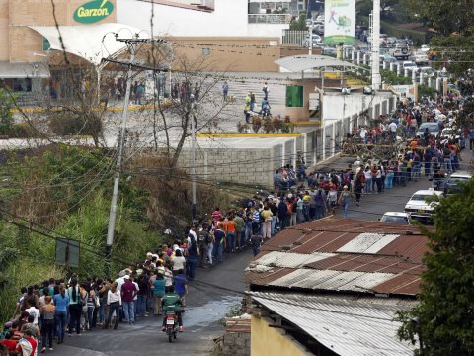
The Bolivarian Socialist revolution has claimed the lives of 41 Venezuelans and forced thousands of others to suffer long lines in supermarkets for basic needs. While the political situation in the country remains dire, the economic situation continues to worsen: Venezuela’s inflation rate reached 60% this month.
According to Infobae, prices on common goods increased 4.1% in March, with rates increasing 59.4% between March 2013 and March 2014. The numbers are late because the Venezuelan government is late on reporting them — reporting March’s inflation statistics fifteen days later than the legal requirement imposed by the Chavista government on themselves. There is no indication that the individuals running the Venezuelan bureau of economic statistics will receive any punishment for delaying the release of such information.
The individual statistics for products the Venezuelan government is struggling to import are even more troubling. Venezuelan newspaper El Universal reports that nineteen products have been placed on a “scarcity list,” meaning their availability in the nation is limited. These include vegetable oil, wheat flour, milk, coffee, sugar, canned sardines, pork, and butter, along with eleven other products. A number of these other rare products are derivative of these. Margarine, which is on the list, is made of vegetable oil, and a number of milk products are also running out. The government did not provide any potential solutions to the problem. President Nicolás Maduro has taken to the airwaves heavily in recent weeks to blame the scarcity of basic goods on American “imperialism.”
This week, Maduro launched a “second economic offensive,” a term he prefers relative to his description of the economic downturn as a “war.” The offensive would require business owners to significantly lower the prices of goods and would focus on punishments for individuals on the western border with Colombia who have been buying and trading goods on the black market. Many capitalist observers have condemned the program for its focus on fines and punishments for those in the middle class trying to survive the economic depression, without offering solutions to satisfy the demand for goods like sugar and flour.
Maduro also recently imposed ration cards on Venezuelan buyers, denying Venezuelans the right to buy as much of a product as they would need. The ration cards, an idea taken from the Cuban government, were widely received with jeers both in the Venezuelan streets and by the international community. Along with the ration cards, Maduro has forced grocery store owners to install fingerprint identification technology to prevent people from cheating the ration system, and has begun forcing store owners to sell their businesses.

COMMENTS
Please let us know if you're having issues with commenting.